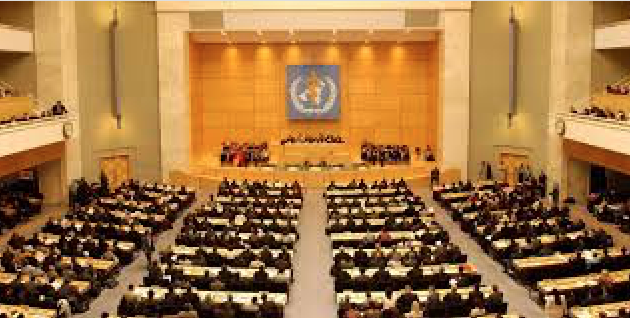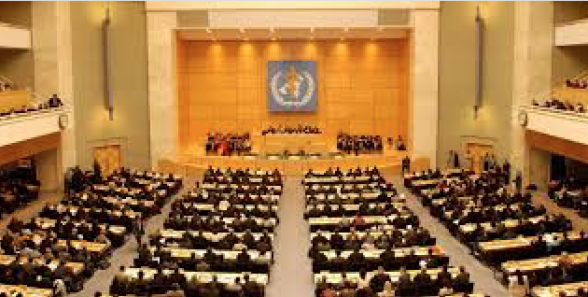 World Health Assembly 73 #WHA73
World Health Assembly 73 #WHA73
Due to the current COVID-19 pandemic, the 73rd World Health Assembly will be virtual. The agenda has been reduced to fit into two days, starting on Monday 18 May and concluding no later on Tuesday 19 May. It can be viewed live. The programme will cover:
- Opening of the Health Assembly by WHA 72 President
- Election of the President and five Vice-Presidents
- Presidential address
- Statements by invited speakers
- Address by the Director-General (on COVID-19 pandemic response)
- Statements by Heads of delegation on COVID-19 pandemic
- EB: election
- Closure/suspension (The WHA will consider suspending and reconvening later in the year to consider the remaining items on the agenda)
WHO Civil Society Working Group on NCDs
May 2020 Statement
The 36 members of the WHO Civil Society Working Group on Non Communicable Diseases (NCDs) commend the World Health Organization and Dr Tedros for his leadership as the world grapples with the coronavirus (COVID-19) pandemic. An empowered, well-resourced World Health Organisation (WHO) is essential to lead governments, other stakeholders, and people through these trying times.
The COVID-19 pandemic has demonstrated more than ever the need for resilient health systems, especially ones that are equipped to respond to the growing burden of non-communicable diseases (NCDs). NCDs and their risk factors are exerting a heavy toll on health systems around the world, draining scarce resources even though they are largely preventable. The current public health crisis illustrates that health promotion is essential both for health emergency preparedness and sustainability of health systems, as is universal health coverage that ensures access to essential services and care without incurring financial hardship. Both COVID-19 and NCDs are indiscriminate actors, disproportionately impacting the poorest and most vulnerable people in all countries.
Emerging evidence from the COVID-19 pandemic suggests that people living with NCDs and other chronic conditions - in particular hypertension and cardiovascular diseases, cancer, diabetes, respiratory diseases, obesity, and mental and neurological health conditions such as dementia - are at higher risk of severe illness or death from the virus. Yet, even in the midst of a public health emergency of international concern, companies that produce harmful products, such as tobacco, alcohol and sugar-sweetened beverages, continue to spread misinformation and deny the link between the harmful effects of their products and COVID-19 to protect their markets.
We call on governments to ensure:
● NCDs prevention and treatment are included in national preparedness plans, beginning with inclusion of NCDs in national COVID-19 responses as part of global health security, acknowledging the links between COVID-19 complications and underlying chronic conditions.
● The continued delivery of routine chronic care, supplies of essential medicines and technologies, screening and diagnosis, access to resources, and supportive and palliative services for ongoing management of NCDs, mental health, and other chronic conditions.
● Precautionary measures are taken to protect both people living in care homes and other residential facilities and children, who may be predisposed to chronic, long-term morbidity due to COVID-19 infections, as evidenced by a multisystemic inflammatory response that may cause damage to multiple organ systems.
● Healthcare workers are recruited, trained, protected, and well-resourced to meet the current and future demand for chronic care and the COVID-19 pandemic. Special attention is needed to ensure the mental health and well-being of healthcare workers is supported.
● People living with NCDs and comorbidities, older people, young people, civil society and those most affected are consulted and meaningfully involved in the development, implementation, monitoring and evaluation of international, national, and local COVID responses.
● NCD prevention and health promotion continues to be prioritised to protect and strengthen population health and health systems, especially under ‘lockdown conditions,’ and is aligned with the WHO NCD Global Action Plan. Regulations and restrictions for industries that produce health-harmful commodities, including tobacco, alcohol, sugar-sweetened beverages, and fossil fuels, should be reinforced and not relaxed during the pandemic.
● Legally binding policies are created and implemented in collaboration with civil society for greater transparency, accountability, monitoring and enforcement in order to achieve good health and well-being for all, while preventing and addressing conflicts of interest.
● Particularly harmful products, such as tobacco and alcohol, are declared non-essential within pandemic responses with restrictions on availability and marketing. Physical activity and healthy diets should be actively promoted and supported, measures to reduce air pollution implemented rapidly, and food security should be addressed with due consideration to nutrition and health of diets.
● Engagement with unhealthy commodity industries is limited or ceased. This includes where there are real or perceived conflicts of interest through corporate social responsibility activities such as production and provision of PPE, sanitizers, processed food and beverages in care packs, new logistics partnerships, publication and reporting of pseudo-science, and political influence on policy.
● Digital health solutions are identified and scaled up by developing data systems that provide clear and accurate information for national health experts and the general public.
● Media are sensitised to report responsibly on health issues especially where misinformation is suspected, and to prevent uptake and promotion of such misinformation.
The WHO Civil Society Working Group on NCDs and the NCD community remains committed to elevating the voices of civil society and people living with NCDs and supporting WHO and governments during this pandemic and in the post-pandemic recovery period.
************************************************************************
Reminder to register for our second May "Meeting Of The Minds" Webinar, Safe and Just Futures in Residential Aged Care; Lessons Learned.
************************************************************************
Members of the World Health Organisatin (WHO) Civil Society Working Group (CS WG) on Non Communicable Diseases (in alphabetical order):
1. Dr Monika Arora, Healthy India Alliance, India
2. Ms Kwanele Asante, Our Views, Our Voices global advisory committee, South Africa
3. Prof Naby Baldé, International Diabetes Federation, Guinea
4. Mr Stephane Besançon, Santé Diabète, France
5. Mr Enzo Bondioni, World Dental Federation, Switzerland
6. Ms Chantelle Booysen, Youth Leaders for the Lancet Commission on Global Mental Health and Sustainable Development, South Africa
7. Dr Beatriz Champagne, Healthy Latin America Coalition, Argentina
8. Dr Stephen Connor, World Palliative Care Alliance, USA 9. Ms Katie Dain, CEO, NCD Alliance (Co-Chair)
10. Dr Mitra Rouhi Dehkordi, The Association for International Sports for All, Iran
11. Dr Ulysses Dorotheo, South East Asia Tobacco Control Alliance, Philippines
12. Dr Ibtihal Fadhil, EMRO NCD Alliance, Iraq
13. Dr Mychelle Farmer, NCD Child, USA
14. Mr Juan Núñez Guadarrama, Salud Justa, Mexico
15. Sir Trevor Hassell, Healthy Caribbean Coalition, Barbados
16. Mr David Kalema, Hope and Beyond, Uganda
17. Mr Chris Lynch, Alzheimer’s Disease International, United Kingdom
18. Princess Dina Mired, Union for International Cancer Control, Jordan
19. Dr Mwai Makoka, World Council of Churches, Malawi
20. Ms Narcisa Mashienta, Ikiama Nukuri, Ecuador
21. Dr George Msengi, NCD Child, Tanzania
22. Mr Christophe Ngendahayo, International Federation of Medical Students Associations, Rwanda
23. Ms Leslie Rae, Framework Convention Alliance, Canada
24. Ms Johanna Ralston, World Obesity Federation, USA
25. Ms Belen Ríos, O´Neill Institute for National and Global Health Law, Georgetown University, USA
26. Prof Trevor Shilton, International Union for Health Promotion and Education, and International Society for Physical Activity and Health, Australia
27. Dr Sudhvir Singh, EAT Foundation, Norway
28. Dr Tara Singh Bam, International Union Against Tuberculosis and Lung Disease, Nepal
29. Ms Anjali Singla, Movement for Global Mental Health, India
30. Ms Kristina Sperkova, Movendi International, Slovakia
31. Ms Charlene Sunkel, Global Mental Health Peer Network, South Africa
32. Ms Kate Swaffer, Dementia Alliance International, Australia
33. Ms Phaeba Thomas, HealthBridge South Asia, India
34. Dr Nick Watts, Lancet Countdown on Health and Climate Change, United Kingdom
35. Prof Gerald Yonga, East Africa NCD Alliance, Kenya
36. Dr Yoshitake Yokokura, World Medical Association, Japan
